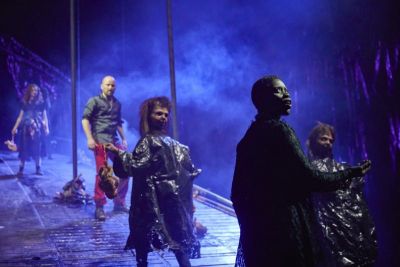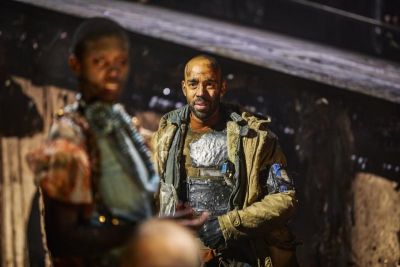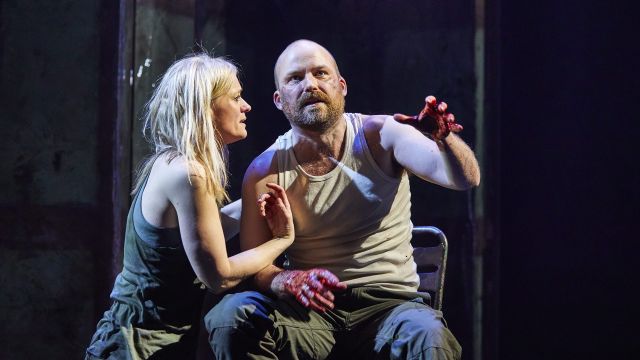Macbeth
Director Rufus Norris sets his Macbeth in a dystopian world, in the chaos, barbarity and destruction of the aftermath of a civil war.
It’s a world where any ‘rule of law’ is gone, where hierarchies are vitiated, where all manufacturing has been destroyed, civility is replaced with vicious violence and loyalties become tribal. Rory Kinnear deploys his ‘ordinary bloke’ persona brilliantly as Macbeth. He’s a fierce, brave warrior (let’s not say ‘soldier’ in this context, guerrilla might be closer) loyal to his king, Duncan (Stephen Boxer). Then suddenly, thanks to the Witches, he sees a future for himself he hadn’t imagined – and his wife (Anne-Marie Duff) seizes on it without a second’s hesitation.
The tragedy, if that’s the word, is brought out so well by Mr Kinnear and Ms Duff: Macbeth and Lady Macbeth murder Duncan… and then? He wanted to be king. She wanted him to be king. Now he is. For the rest of the play, until she goes mad, Lady Macbeth will be continually screwing his courage to the sticking place. For him, the rest of the play is about what he must do to stay king. And that is to become a hated monster, nevertheless way out of his depth, to watch his wife go mad and to reach that famous conclusion that life is nothing but a ‘tale told by an idiot, full of sound and fury, signifying nothing’.

Without the murder of the king, and the terror and guilt that unleashes, would stolid soldier Macbeth have found those reserves of powerful, almost beautiful poetry he expresses in his soliloquies? Mr Kinnear shows us his terror and his guilt with great power, his very persona suggesting that he has felt neither of these things before and is tortured by them, articulating them almost without understanding.
At the same time, this production and the play itself are bigger than the tale of a bloody power grab and its aftermath. Like much in Shakespeare, the play speaks to today. In Act IV, Scene II, Ross (Penny Layden) tells Lady Macduff (Amaka Okafor):
But cruel are the times, when we are traitors/ And do not know ourselves, when we hold rumour/ From what we fear, yet know not what we fear, / But float upon a wild and violent sea/ Each way and move. There’s a chill in those words: for us, it’s the ruthlessness of world ‘leaders’, our uncertainties, our ‘fake news’, our fears of revolution, disruption, upheaval and tribal warfare.
The problem, however, or should I say risk, in relocating Macbeth to another time and place is that the play can suffer a loss of credibility and of the ‘majesty that attends on kings’. When previously loyal warrior Macbeth kills his king, it is – or can be – a huge crime, way beyond mere murder. Compare the guilty suffering of Shakespeare’s Henry IV, who achieved his crown by violence. In Mr Norris’ shattered world of warring factions, we might wonder what Duncan is really king of? Perhaps he represents some restored stability now that a rebellion led by the Thane of Cawdor has been put down? And surely any stability can only temporary. But in this production too, Mr Boxer’s Duncan lacks grandeur or even gravitas; we don’t believe the loyalty and affection his warrior courtiers mouth – and when he’s murdered, the reaction might as well be a shrug as the horror the characters are called on to express. And then it follows that we wonder just what Macbeth becomes king of?

Mr Norris’ concept dictates a Year Zero, reduced-to-rubble land of half-shattered blockhouses and tottering windowless structures, strewn with debris. It’s a landscape created so convincingly by designer Rae Smith that it’s all too familiar from our television news - it’s Aleppo, Mosul, Gaza – emphasised by James Farncombe’s lighting, as if the whole tale happens in the gloom of night or under a pall of smoke.
When Macbeth invites his cohorts to dinner – the dinner at which Banquo’s ghost appears – the plates are blackened dixies, the glasses plastic or metal mugs. Moritz Junge’s costumes are literally things of rags and patches, held together with gaffer tape and pins. It’s an improvised world by grim necessity. But where are the guns? It’s part of Mr Norris premise that this world is so reduced there aren’t even guns and ammunition. But more or less contemporary dress in recognisable scenes of contemporary ruin, and no guns? We know that nowadays there are always guns – from somewhere. Macbeth and his fellow warriors all tote machetes with which they slash, kill and decapitate. It ups the savagery, but is it credible? This question and that of the meaning of kingship here give rise to doubts – perhaps only for me – but they are there.
The previous Shakespeare from the National Theatre and NTL, Julius Caesar, avoided these traps and swept the audience along with its clarity.

The triumphs of this production are in its design - and in its intimate, emotional moments. Lady Macbeth’s urging of her vacillating husband is a scene of brutal marital devastation, so much in contrast with their passion for each other. Banquo (Kevin Harvey) is so likeable and so clearly Macbeth’s best mate that the necessity to kill him is all the more horrible. The playful scene between Lady Macduff and her son (Hannah Hutch), so beautifully played by the actors, when we know the murderers are on the way is just one touch of Shakespeare’s genius. Patrick O’Kane is perfect casting as Macduff. A big man with a face that looks to be carved from granite, a fearsome warrior, he crumbles and breaks our hearts when he learns of the death of his wife and children - and then that overpowering loss fuels his palpable, burning hatred for Macbeth and his glee with which he kills him.
For me, this production involves some flawed choices in its premise and the realisation of that premise. But if we can put that aside, we hear Shakespeare’s words clearly spoken, and see world that could well be our feared future and we feel the humanity of those who have to live in it.
Michael Brindley
Images: Brinkhoff Mögenburg
Subscribe to our E-Newsletter, buy our latest print edition or find a Performing Arts book at Book Nook.

